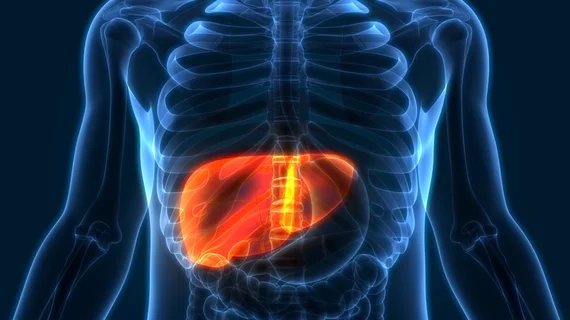Interventional procedure often as effective as surgery for difficult-to-treat liver cancer
For many patients, radiofrequency ablation is just as effective as surgical resection for treating intrahepatic cholangiocarcinoma (iCCA), a large new meta-analysis shows.
Cases of iCCA have been steadily increasing over the last decade in the United States and it is now the second most common type of primary hepatic cancer. Due to its location, it can be difficult to treat the cancer, and many people are diagnosed with iCCA at an unresectable stage. Even with surgery, cancer recurrence is common among those with iCCA.
Given the complex nature of this cancer, efforts to develop more effective methods of treating it have increased over the years. Ablative therapies have emerged as a potential alternative to surgery for hepatocellular carcinoma and liver metastases stemming from colorectal cancer, but research on radiofrequency ablation for iCCA specifically has been limited to small sample sizes.
“The low utilization of ablation in iCCA treatment is multifactorial, including the relatively lower incidence of iCCA, advanced stage at diagnosis and technical limitations in treating larger tumors, and the increasing use of transarterial therapy and external beam radiation, all of which hinder the conduct of large-scale clinical trials,” corresponding author Qian Yu, MD, with the Department of Vascular and Interventional Radiology at University of Chicago Medical, and colleagues explained.
To get a better idea of how ablative therapy compares to other treatment methods, the team analyzed two decades' (2000-2020) worth of data from a national cancer database. Information on patient demographics, overall survival and cancer-specific survival were examined to determine if any factors affected outcomes. The findings were then compared to cases involving surgical resection and radiation therapy.
There were just under 200 patients in the ablation group. Outcomes for ablation saw significant improvement from 2010 to 2020. A number of patient factors, including tumor size and stage, were associated with the improvement. Patients with tumors smaller than 3 centimeters and who were diagnosed at an earlier stage had the highest rates of overall survival. For patients with tumors smaller than 3 centimeters, outcomes were comparable between ablation and resection, both of which outperformed radiotherapy.
Considering the additional benefits associated with ablation—reduced costs, shorter hospital stays and less risk of adverse events—the group suggested that it should be considered as an alternative treatment option for patients with iCCA. However, patient selection is critical to ensure the most positive outcomes, the authors added.
Learn more about the study here.

